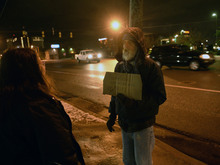This is an archived article that was published on sltrib.com in 2014, and information in the article may be outdated. It is provided only for personal research purposes and may not be reprinted.
Homelessness is a problem for law enforcement. But it is not a law enforcement problem.
Homelessness is a social, economic, mental health, substance abuse and health care problem. There are times when the misbehavior of homeless people requires someone to call the police. But it would be unfair to the police and cruel to the homeless to turn the woes of chronic homelessness over to even the most highly trained, even the most compassionate, law enforcement officers and expect them to take the problem off everyone else's hands.
The issue crossed the public agenda the other day when the Salt Lake City Planning Commission was asked to extend the permit held by The Road Home homeless shelter near Pioneer Park to use the nearby St. Vincent de Paul's cafeteria as an overflow shelter during the winter.
The permit was, rightly, approved. But not before a healthy airing of concerns from several people who know the area and worry that anti-social, aggressive, sometimes criminal behavior on the part of some homeless people has again taken over the area. It was a concern not alleviated by official stats that show overall crime in the neighborhood is down.
But in just about every case, the moment it became necessary to dial 911 was a moment that came after a poverty-stricken, often mentally ill or drug-addicted, human had fallen through a great many cracks in the formal and informal safety nets that are supposed to prevent such a condition.
If we want to spare our fellow human beings the plight of homelessness, if we want to spare ourselves the pain of seeing, avoiding, dodging, fearing and trying to decide whether or not to give money to the homeless, we have to change the equation long before anybody calls the cops.
The primary cure for homelessness is, of course, a home. Efforts to find appropriate housing for those who lack it is the first duty of a civilized society, whether through nonprofit groups or through government programs. But many of those who are given housing relief will still be in need of health, particularly mental health, services.
That is why the full expansion of Medicaid, envisioned by the original Affordable Care Act but rejected by our state leaders, would have been the single biggest step toward ending homelessness. It would provide both physical and mental health services that now only exist on an intermittent basis and at great cost to local officials or nonprofits.
We've already done untold damage to society by trying to solve another public health problem — drugs — with absurd law enforcement solutions. The worst thing we could do now would be to criminalize homelessness.



